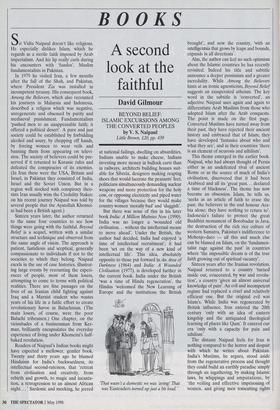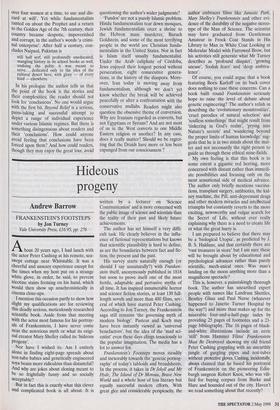BOOKS
A second look at the faithful
David Gilmour
BEYOND BELIEF: ISLAMIC EXCURSIONS AMONG THE CONVERTED PEOPLES by V. S. Naipaul Little Brown, £20, pp. 439 Sit Vidia Naipaul doesn't like religions. He especially dislikes Islam, which he regards as a sterile faith imposed by Arab imperialism. And his lip really curls during his encounters with `fundos', Muslim fundamentalists in Pakistan.
In 1979 he visited Iran, a few months after the fall of the Shah, and Pakistan, where President Zia was installed in incompetent tyranny. His consequent book, Among the Believers, which also recounted his journeys in Malaysia and Indonesia, described a religion which was negative, unregenerate and obsessed by purity and mediaeval punishment. Fundamentalism `pushed men to an unappeasable faith; it offered a political desert'. A pure and just society could be established by forbidding alcohol and usury, by chopping off hands, by forcing women to wear veils and banning them from appearing on televi- sion. The society of believers could be pre- served if it returned to Koranic rules and defeated the conspiracies of its. enemies. (In Iran these were the USA, Britain and Israel, in Pakistan they consisted of India, Israel and the Soviet Union. But in a region well stocked with conspiracy theo- rists Iran usually wins the Credulity Stakes: on his recent journey Naipaul was told by several people that the Ayatollah Khomei- ni had been a British agent.) Sixteen years later, the author returned to the same four countries to see how things were going with the faithful. Beyond Belief is a sequel, written with a similar structure and technique and observed from the same angle of vision. The approach is patient, fastidious and sceptical, generally compassionate to individuals if not to the societies to which they belong. Naipaul excels in the use of case histories, illustrat- ing large events by recounting the experi- ences of people, most of them losers, attempting to come to terms with political realities. There are fine passages on the lives of an Iranian child fighting against Iraq and a Marxist student who wastes years of his life in a futile effort to create revolutionary havoc in Baluchistan, (The main losers, of course, were the poor Baluchi tribesmen.) One chapter, on the vicissitudes of a businessman from Ker- man, brilliantly encapsulates the everyday experience of living under Khomeini's half- baked revolution.
Readers of Naipaul's Indian books might have expected a mellower, gentler book. Twenty and thirty years ago he blamed Hinduism for India's backwardness, its intellectual second-rateness, that 'retreat from civilisation and creativity, from rebirth and growth, to magic and incanta- tion, a retrogression to an almost African night... ' Sardonic and mocking, he jeered at national failings, dwelling on absurdities, Indians unable to make cheese, Indians investing more money in bullock carts than in railways, architects building houses suit- able for Siberia, designers making reaping shoes that would lacerate the peasants' feet, politicians simultaneously demanding nuclear weapons and more protection for the holy cow, or opposing electricity and piped water for the villages because they would make country women 'morally bad' and 'sluggish'.
But there was none of this in his later book India: A Million Mutinies Now (1990). India was no longer a 'wounded old civilisation... without the intellectual means to move ahead'. Under the British, the author had decided, India had enjoyed 'a time of intellectual recruitment'; it had been 'set on the way of a new kind of intellectual life'. This idea, absolutely opposite to those put forward in An Area of Darkness (1964) and India: A Wounded Civilisation (1977), is developed further in the current book. India under the British `was a time of Hindu regeneration', the Hindus 'welcomed the New Learning of Europe and the institutions the British `That wasn't a domestic we was 'aving! That was Eastenders turned up just a bit loud.' brought', and now the country, 'with an intelligentsia that grows by leaps and bounds, expands in all directions'.
Alas, the author can feel no such optimism about the Islamic countries he has recently revisited. Indeed his title and subtitle announce a deeper pessimism and a greater incredulity. While Among the Believers hints at an ironic agnosticism, Beyond Belief suggests an exasperated atheism. The key word in the subtitle is 'converted', an adjective Naipaul uses again and again to differentiate Arab Muslims from those who adopted Islam after the Arab conquests. The point is made on the first page. Converted Muslims have turned away from their past, they have rejected their ancient history and embraced that of Islam; they have developed 'fantasies about who and what they are', and in their countries 'there is an element of neurosis and nihilism'.
This theme emerged in the earlier book. Naipaul, who had always thought of Persia either as an undefeated rival of ancient Rome or as the source of much of India's civilisation, discovered that it had been Arabised and all its 'great past.. . declared a time of blackness'. The theme has now become an obsession. Islam, he tells us, `seeks as an article of faith to erase the past; the believers in the end honour Ara- bia alone; they have nothing to return to'. Indonesia's failure to protect the great Buddhist monument of Borobudur in Java, the destruction of the rich rice culture of western Sumatra, Pakistan's indifference to Mohenjo-daro — all this and much else can be blamed on Islam, on the 'fundamen- talist rage against the past' in countries where 'the impossible dream is of the true faith growing out of spiritual vacancy'.
Sixteen years after the Iranian revolution, Naipaul returned to a country 'turned inside out, eviscerated, by war and revolu- tion', a country 'given an almost universal knowledge of pain'. An evil and incompetent regime had replaced a cruel and relatively efficient one. But the original evil was Islam's. While India was regenerated by British influence, Iran entered the 20th century 'only with an idea of eastern kingship and the antiquated theological learning of places like Qum'. It entered our era 'only with a capacity for pain and nihilism'.
The distaste Naipaul feels for Iran is nothing compared to the horror and despair with which he writes about Pakistan. India's Muslims, he argues, stood aside from the regenerative process and thought they could build an earthly paradise simply through an ingathering, by making Islamic laws, by whippings and amputations, by `the veiling and effective imprisoning of women, and giving men tomcatting rights over four women at a time, to use and dis- card at will'. Yet while fundamentalists ranted on about the Prophet and a return to the Golden Age of the 7th century, their country became despotic, impoverished and corrupt, in the author's words 'a crimi- nal enterprise'. After half a century, con- cludes Naipaul, Pakistan is
still half serf, still profoundly uneducated, mangling history in its school books as well, undoing the polity it was meant to serve... dedicated only to the idea of the cultural desert here, with glory — of every kind — elsewhere.
In his prologue the author tells us that the point of the book is the stories and their complexities; the reader should not look for 'conclusions'. No one would argue with the first bit. Beyond Belief is a serious, pains=taking and successful attempt to depict a range of individual experience under various Islamic regimes. But there is something disingenuous about readers and their 'conclusions'. How could anyone avoid feeling that conclusions have been forced upon them? And how could readers, though they may enjoy the great tour, avoid questioning the author's wider judgments?
`Fundos' are not a purely Islamic problem. Hindu fundamentalists tear down mosques, Jewish fundamentalists erect a shrine to the Hebron mass murderer, Baruch Goldstein, and some of the most terrifying people in the world are Christian funda- mentalists in the United States. Nor in fact is Islam itself usually fundamentalist. Under the Arab caliphate of Cordoba, Jews enjoyed their longest period without persecution, eight consecutive genera- tions, in the history of the diaspora. More- over, Iran today is moving away from fundamentalism, although we don't yet know whether the break will be achieved peacefully or after a confrontation with the conservative mullahs. Readers might also question the obsessive theme of conversion. Why are Iranians regarded as converts, but not Egyptians or Syrians? And are not most of us in the West converts to one Middle Eastern religion or another? In any case, does it really matter? Should we be regret- ting that the Druids have more or less been expunged from our consciousness ?



























































 Previous page
Previous page